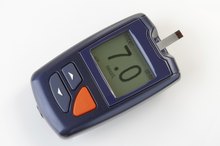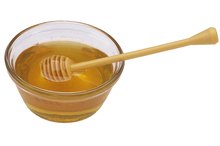What does fact checked mean?
At Healthfully, we strive to deliver objective content that is accurate and up-to-date. Our team periodically reviews articles in order to ensure content quality. The sources cited below consist of evidence from peer-reviewed journals, prominent medical organizations, academic associations, and government data.
The information contained on this site is for informational purposes only, and should not be used as a substitute for the advice of a professional health care provider. Please check with the appropriate physician regarding health questions and concerns. Although we strive to deliver accurate and up-to-date information, no guarantee to that effect is made.
Dextrose Vs. Fructose
Fructose and dextrose are two different types of sugar. Other sugars include lactose, maltose and sucrose 1. Different kinds of foods contain different sugars. For example, fruit contains fructose, while milk supplies lactose, maltose can be found in beer and malt whiskey, and fruits and plant saps are sources of dextrose. The latter is also referred to as glucose.
The Body's Fuel
Dextrose or glucose, the type of sugar used to measure blood sugar levels, is a primary source of energy for almost all cells of the body, including brain cells. Glucose exists at a 1 percent concentration in human blood and is the most important sugar in metabolism. The body manufactures it from carbohydrates like fruit, cereal, bread, pasta and rice.
- Dextrose or glucose, the type of sugar used to measure blood sugar levels, is a primary source of energy for almost all cells of the body, including brain cells.
- Glucose exists at a 1 percent concentration in human blood and is the most important sugar in metabolism.
How Sweet It Is
Foods Containing Glucose or Fructose
Learn More
Fructose, the sugar that gives fruit its sweet flavor, is also present in vegetables and honey. For the past two decades fructose, in its crystalline form, has been used as a nutritive sweetener in foods and drinks 4. Crystalline fructose is a processed form of fructose that consists of at least 98 percent pure fructose and is estimated to be about 20 percent sweeter than table sugar.
Sugar Differences
Fructose and glucose have a lot in common 1. Both are simple sugars that provide cellular energy to the body. Fructose, however, does not cause insulin secretions, as glucose does. This effect can lead to higher rates of fat storage, according to one 2002 study published in the "American Journal of Clinical Nutrition" that notes the chance of weight gain is increased for those who consume diets that are high in fructose.
- Fructose and glucose have a lot in common 1.
- Fructose, however, does not cause insulin secretions, as glucose does.
Health Effects
Sources of Sucrose Sugar
Learn More
High fructose corn syrup (HFCS) is a widely used processed sweetener containing both fructose and glucose. The most used varieties include HFCS 55, which contains 55 percent fructose and 42 percent glucose, and HFCS 42, which contains 42 percent fructose and 53 percent glucose. Many health concerns surround high fructose corn syrup 5. The Huffington Post cites research from the University of Oxford and the University of Southern California that found a 20 percent increased incidence of type-2 diabetes in counties where HFCS was used throughout the food supply. In general, diets high in sugar, regardless of the type, should be avoided for good health.
- High fructose corn syrup (HFCS) is a widely used processed sweetener containing both fructose and glucose.
Related Articles
References
- Dictionary.com: What Are the Differences Among Fructose, Glucose, Lactose, Maltose, and Sucrose?
- MedlinePlus: Glucose Test - Blood
- Georgia State University: Glucose
- Los Angeles Times: Is Crystalline Fructose a Better Choice of Sweetener?
- University of Maryland: Study - Not Enough Evidence to Indict High Fructose Corn Syrup in Obesity
- Elliott SS, Keim NL, Stern JS, Teff K, Havel PJ. "Fructose, weight gain, and the insulin resistance syndrome." Am J Clin Nutr. 2002 Nov;76(5):911-22. http://ajcn.nutrition.org/content/76/5/911.full.
- Forshee RA, Storey ML, Allison DB, Glinsmann WH, Hein GL, Lineback DR, Miller SA, Nicklas TA, Weaver GA, White JS. "A critical examination of the evidence relating high fructose corn syrup and weight gain." Crit Rev Food Sci Nutr. 2007;47(6):561-82. http://www.tandfonline.com/doi/abs/10.1080/10408390600846457.
- Parks EJ, Skokan LE, Timlin MT, Dingfelder CS. "Dietary sugars stimulate fatty acid synthesis in adults." J Nutr. 2008 Jun;138(6):1039-46. http://jn.nutrition.org/content/138/6/1039.
- Sievenpiper JL, de Souza RJ, Mirrahimi A, Yu ME, Carleton AJ, Beyene J, Chiavaroli L, Di Buono M, Jenkins AL, Leiter LA, Wolever TM, Kendall CW, Jenkins DJ. "Effect of fructose on body weight in controlled feeding trials: a systematic review and meta-analysis." Ann Intern Med. 2012 Feb 21;156(4):291-304. http://www.ncbi.nlm.nih.gov/pubmedhealth/PMH0034296/.
- Sonestedt E, Overby NC, Laaksonen DE, Birgisdottir BE. "Does high sugar consumption exacerbate cardiometabolic risk factors and increase the risk of type 2 diabetes and cardiovascular disease?" Food Nutr Res. 2012;56. doi: 10.3402/fnr.v56i0.19104. http://www.ncbi.nlm.nih.gov/pmc/articles/PMC3409338/.
Writer Bio
Clay McNight is currently a nutrition writer with Demand Media Studios.









